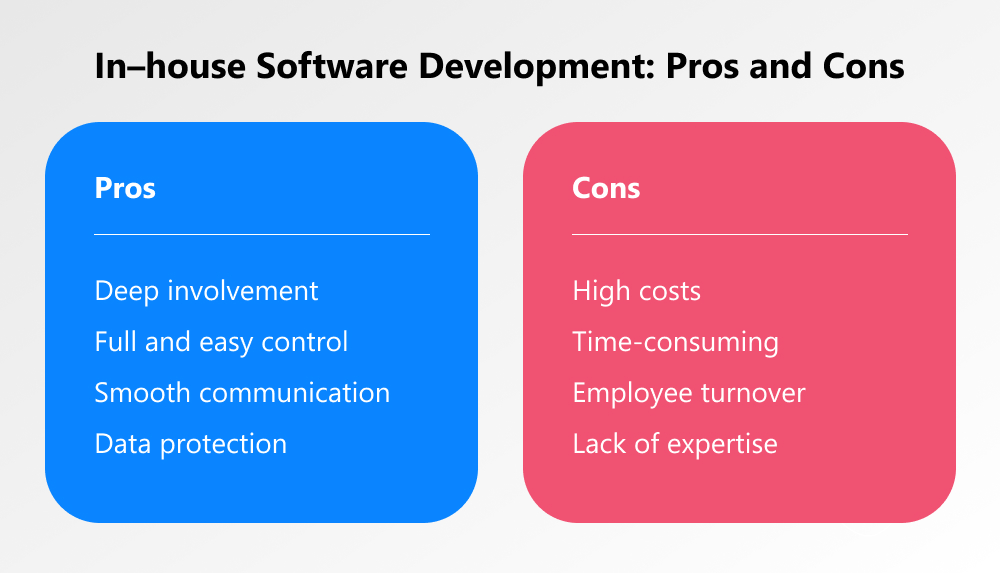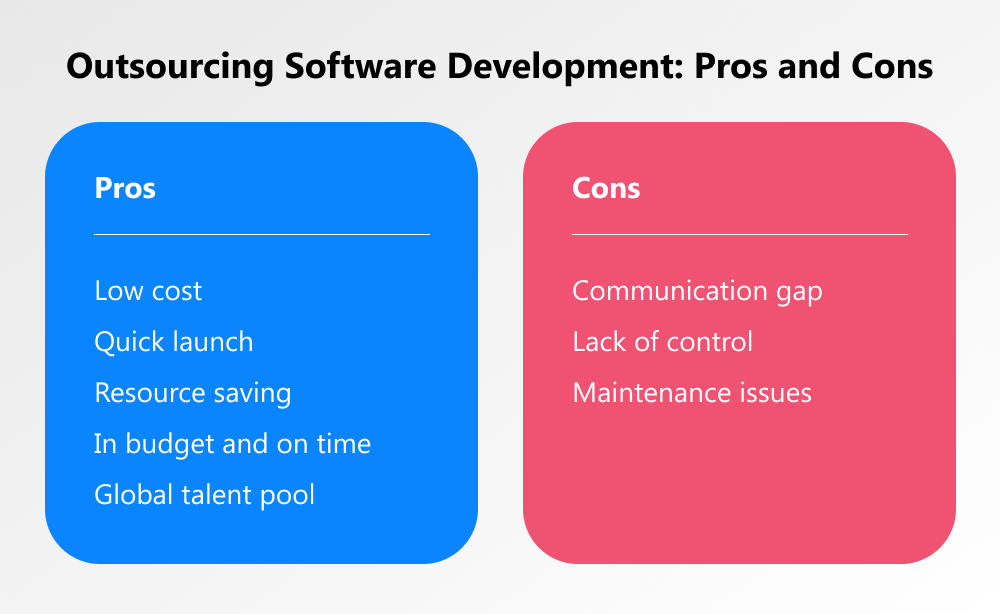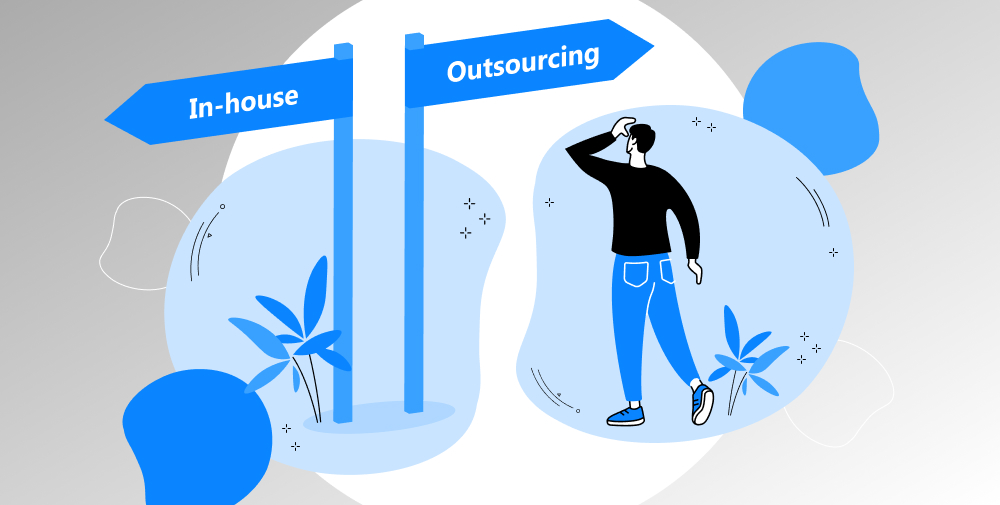Now and again every software development company wonders how to create a product: to use its own employees and tools or hire an outsourced team? Some businesses prefer to develop software products with the help of an in–house development team, believing that only in this case the problems will be solved quickly and efficiently. Others consciously use the expertise of outsourcing specialists in order to optimize financial and time expenditures and concentrate their own resources on higher priority tasks. Which of these ways is the best?
written by:
Nadezhda Mal
Now and again every software development company wonders how to create a product: to use its own employees and tools or hire an outsourced team? Some businesses prefer to develop software products with the help of an in–house development team, believing that only in this case the problems will be solved quickly and efficiently. Others consciously use the expertise of outsourcing specialists in order to optimize financial and time expenditures and concentrate their own resources on higher priority tasks. Which of these ways is the best?
Contents
What Is In-house development and Why Is It Important?
In–house development means having your own team with the necessary knowledge and skills to work on the projects. You have carefully selected professionals at your fingertips who know the goals and requirements of your business, as well as the internal processes very well. They are completely engaged in all the tasks, and you don't need to contact third parties to perform any operations. Amazon, PayPal, and Salesforce are among the world's leading companies that prefer hiring in–house developers. What benefits does this model offer?
Pros of In–house Development
- Employees are deeply involved in the project. Every in–house team member clearly understands the specifics of your business, knows its goals and pitfalls, and shares your vision. Insourcing staff is able to quickly respond to changes in the internal processes and specifications.
- It's easier to control the development process and track the progress. You exactly know the strengths and weaknesses of your personnel. This allows you to assign appropriate tasks to them directly, measure results in time, and fix the issues as fast as possible.
- You can establish clear communication between the members of your team. In–house developers are more likely to have a similar culture, social background, and language, which makes communication easier and allows avoiding misunderstanding.
- Your confidential information will be sheltered. With an onboard team, you don't need to transfer your business data and other secrets to any external providers. Keeping the project documentation and knowledge inside the company mitigates the risks to lose sensitive data.
Cons of In–house Development
- It's expensive to keep your own developers. Hiring an in–house software engineer in the US will cost almost $158 thousand with taxes and benefits included. In addition to salaries, companies pay for leaves, sick days, retirement, insurance, and other allowance. Also, remember that you will need to equip working places, buy the required programs, and sometimes pay for training courses.
- It takes a lot of time to find a good specialist with specific competencies. DevSkiller found that recruiters spend around 43 days to fill a position. They prepare and publish job descriptions, review applications, and interview candidates. When newcomers are onboard, they also need from several weeks to months to pass training and feed into the project.
- Employees may leave your project. This is one of the biggest risks of in–house software development. Highly–experienced developers are in huge demand. Headhunters always get in touch with them to offer better conditions and higher salaries. When key members leave the team, it can disrupt the well–established development process. It will take time to find a new specialist promptly. The Emplify report shows that 73% of employees are ready to consider new career opportunities.
- There is a risk to face limited expertise. No matter how hard your HR department will look for talented specialists, they won't be able to gather the aces of aces under one shelter. Some members of your in–house team will require additional training, which will lead to additional costs and project delays.
Who Needs to Build an In–house Development Team?
To sum up this part, we can say that hiring an in–house team is a good idea when it's economically feasible. For example, large IT companies prefer to accumulate competencies inside because software development is their core business. They're interested in keeping a wide range of specialists, such as project managers, testers, software engineers, DevOps, and others that will be able to maintain and update the product after the release. Insourcing will be suitable for those companies that want to fully control and ensure the proper level of transparency and security of all the processes.
Let’s Explore Outsourcing Software Development
This approach assumes that your product will be created by the outsourced software development team. According to Statista, the value of IT services rendered by external providers may go beyond $413.72 billion by the end of this year. Companies choose outsourcing to cut costs and bring their solutions to the market faster. Google, Slack, GitHub, Skype, and Alibaba actively use the services provided by dedicated teams. It's time to have a look at the advantages and drawbacks of this way.
Pros of Outsourcing Development
- You have a chance to reduce your in-house software development significantly. Many companies order third-party services when they're going to create a complex product, but they don't have a competent or experienced team to do this. Instead of wasting time and money on searching for specialists with the necessary background or training beginners, businesses prefer to hire an outsourced software development team that will be able to build a product from scratch. The Toptal calculations demonstrate that the base salary of an outsourced developer will grow just by 20%, while the cost of an in–house employee will double.
- This approach provides a faster time–to–market. An outsourced team can quickly launch your product thanks to participation in similar past projects. They don't need to gather required specialists and establish internal processes before starting the development procedures.
- You won't waste your resources. You'll pay for the equipment and tools that you need to implement your project.
- There are no risks that you'll overshoot the budget or miss the deadline. An outsourcing company will be bound by an agreement, according to which it must comply with the terms and conditions. Defining a completion date and estimated cost will save your nerves and sleepless nights.
- Outsourcing gives you access to professionals from all over the world, regardless of their country and time zones. You'll be able to check their portfolio, experience, and skills in advance before asking to join your project. In a short time, you have a chance to assemble your dream team whose knowledge and background will be a good fit for your particular project and demands.
Cons of Outsourcing Development
- There may be communication and cultural issues. You should ensure that the members of your outsourcing software development team can easily contact each other. It may be challenging when they live in different time zones and speak different languages.
- You don't have full control over the progress. Without having direct access to the software development process, it's hard to quickly fix bugs, solve problems, and in general monitor how things are going.
- Some maintenance issues may appear. If you hire an outsourced development company to build your product, you must make sure that all accompanying documentation is properly prepared and submitted.
Why Choose the Outsourced Development Team?
Outsourcing is able to significantly strengthen your in–house team. In terms of cost–cutting, this approach will be profitable for any project. It allows you to get the best highly specialized and expensive specialists for a short period of time. For instance, it's impractical to hire a full–time architect, product manager, analyst, project manager, or testers. When they perform their tasks, they'll be able to join another project, and you don't need to pay for idle hours.
Companies often choose an outsourced product development team when they can't afford to employ top professionals, have a tight budget, or want to launch a new product as soon as possible. External developers may be very helpful when you're working on large–scale and complex projects requiring a large team and narrowly focused specialists. They are often more experienced and know market trends better than an in–house team.
In–House vs Outsourced Development: How to Choose?
- Estimate the complexity of your project and the time it will take to develop it. Always remember about Hofstadter's Law stating that "it always takes longer than you expect, even when you take into account Hofstadter's Law."
- Make sure you'll be able to provide technical expertise. You need it to manage outsourced development teams and understand the quality of the solutions offered by them. Therefore, you should have a competent in–house employee who'll be able to track the progress.
- Try to identify what technologies you will need and whether you'll be able to find the specialists who can implement them. Searching for good professionals requires a lot of time and effort. Moreover, their services may be expensive.
- Define the software development goals. Will your own team be able to meet your demands or you need external developers?
- Calculate the budget of your project. This will allow you to make a decision on in–house software development or hiring outsourced developers.
Wrapping Up
So, both in-house and outsourcing product development have their own pros and cons. Every company should choose the model based on its business objectives, demands, and resources. If software development is your core activity, building an in–house team will be the best option for you. If you want to work with unique specialists and launch your solution quickly, think about outsourcing companies.
Visit our website or contact our experts to get more information about outsourced or in–house software development.

Contacts
Feel free to get in touch with us! Use this contact form for an ASAP response.
Call us at +44 151 528 8015
E-mail us at request@qulix.com










